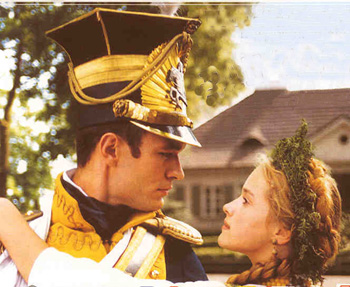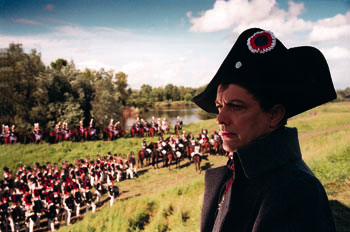
Andrzej Wajda and the filming of Pan Tadeusz
by Peter K. Gessner
 Tadeusz and Zosia |
When the film opened in New York City at $25 a ticket, it caused a commotion on the Upper East Side, the lines stretching around the block. Throughout his career, Wajda, now 74 years old, the director of 40 plus feature films and the son of a Polish officer murdered by the Soviets at Katyn, has chosen, to create movies speaking to the Polish spirit and condition. There have been few exceptions.
In discussing this in an interview with Brendan Lemon of the New York Times, Wajda, Poland foremost film-maker, quoted Rousseau, the Swiss-born philosopher who, in 1771, counseled the Poles facing mighty and rapacious neighbors "You cannot prevent them from swallowing you, so you should at least make sure they don't digest you."
That advice was also followed, in his time, by the author of the poem, Adam Mickiewicz. Cast in prison for political activity by the Russians, then banished to central Russia for five years, he chose, following the unsuccessful uprising of 1831, to go into exile in Paris. A fervent Polish patriot to the end, it was in Paris that he wrote Pan Tadeusz as an evocation of his homeland. Stifled and suppressed in occupied Poland, the country's literature thus flourishes abroad. The first line of the poem, in which Mickiewicz likens his homeland to health, the value of which no one fully perceives until it has been lost, articulates eloquently the pain that wave after wave of Polish émigrés have felt in their hearts. For them, his narrative poem recreated the lost homeland in verse. Wajda has transferred it to the more modern medium of the film.
The film carries no political message; in an interview with Pawe³ Go¼liński, Wajda explicitly stated that, that though during the times of the Soviet-imposed communist regime it was the duty of artists to express what could not be said publicly, now that Poland is a sovereign and functioning democracy, that is no longer their role, since those expressions of opinion occur quite properly in the voting booth.
 Napoleon's Army on its way to Moscow |
In 1807, having defeated the Prussians with Polish help, Napoleon created the Dutchy of Warsaw from the Polish provinces that had been absorbed by Prussia in 1793 and 1975. Now, he was palnning his Russian campaign. His victory there - the Poles hoped - would liberate Polish provinces absorbed by Russia. Appropiately enough, in France, the movie's subtitle is When Napoleon Crossed the Niemen. The Niemen is a river that lies 1000 miles east of Paris and in 1812 it marked the border between the Dutchy of Warsaw and Russia. Having already brought down two empires, those of Prussia and Austria, he amasses a vast army readying it for the invasion of Poland's perennial oppressor, Imperial Russia. Surely, he will succeed and all of Poland again will be free.
Because, in Poland, Mickiewicz's poem has achieved such an exalted place in the pantheon of the country's literary masterpieces, Wajda waited many years before making a decision to bring it to the screen. He did not feel mature enough or sufficiently self-confident as a director - he told Go¼liński - to tackle so highly regarded a work. Once he had decided to go ahead, he had no difficulty in assembling a cast of superstars and most accomplished actors. Participaiting in the filming of Pan Tadeusz is an opportunity that few Polish actors would pass up. Likewise, he had as collaborators the most acclaimed production designer, Allan Starski, Oscar winner for Schindler's List and the film soundtrack composer Wojciech Kilar, veteran of over 140 film scores. The film's breath taking cinematic work, a Polish-French production, was made possible, given all its logistic challenges, owing to the management skills of Lew Rywin of Heritage Productions, the Polish producer of Schindler's List.
Page was first posted on the website of the Polish Arts Club of Buffalo
The Storyline and Context of the Pan Tadeusz
Adam Mickiewicz, Poet, Patriot and Prophet
| Info-Poland a clearinghouse of information about Poland, Polish Universities, Polish Studies, etc. |